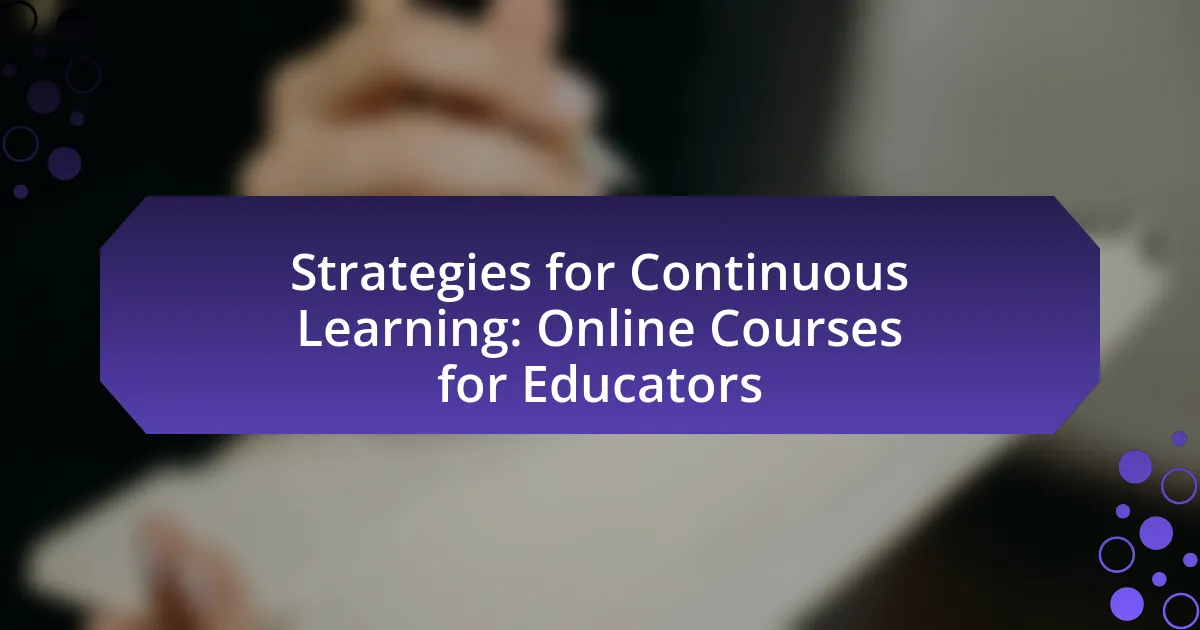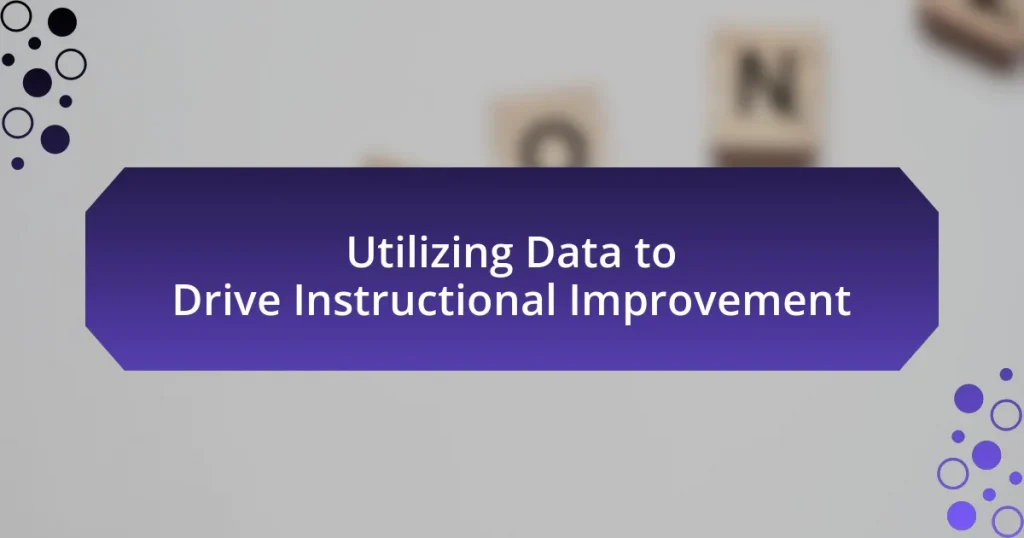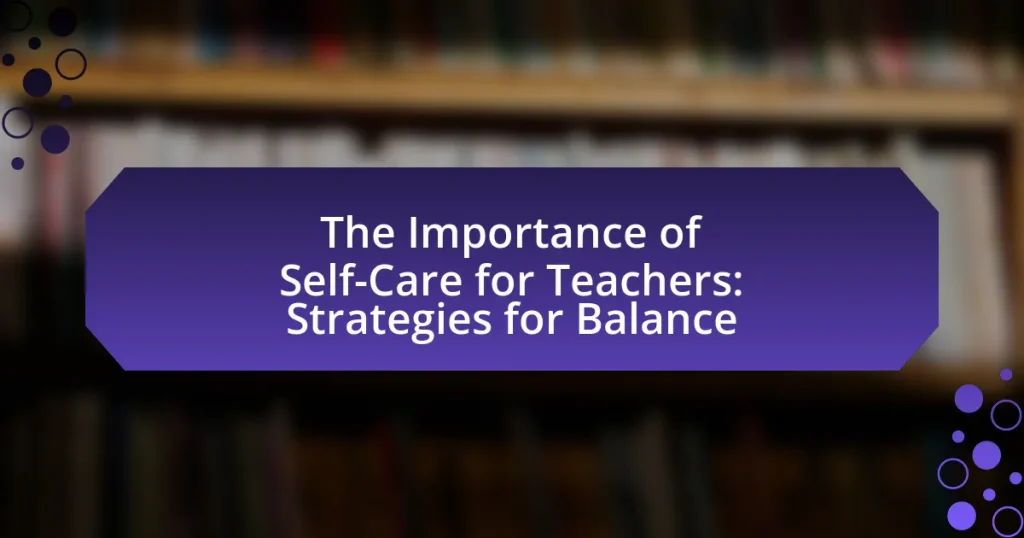The article focuses on strategies for continuous learning through online courses specifically designed for educators. It outlines various methods such as professional development opportunities, peer collaboration, and reflective practices that enhance teaching effectiveness and student outcomes. The article also discusses the role of online courses in providing flexible access to updated content, catering to different learning styles, and incorporating interactive elements to foster engagement. Additionally, it highlights the importance of effective course design, assessment integration, and the use of technology to support educators in their continuous learning journey. Challenges faced by educators, such as time constraints and technological barriers, are also addressed, along with best practices for maximizing the online learning experience.
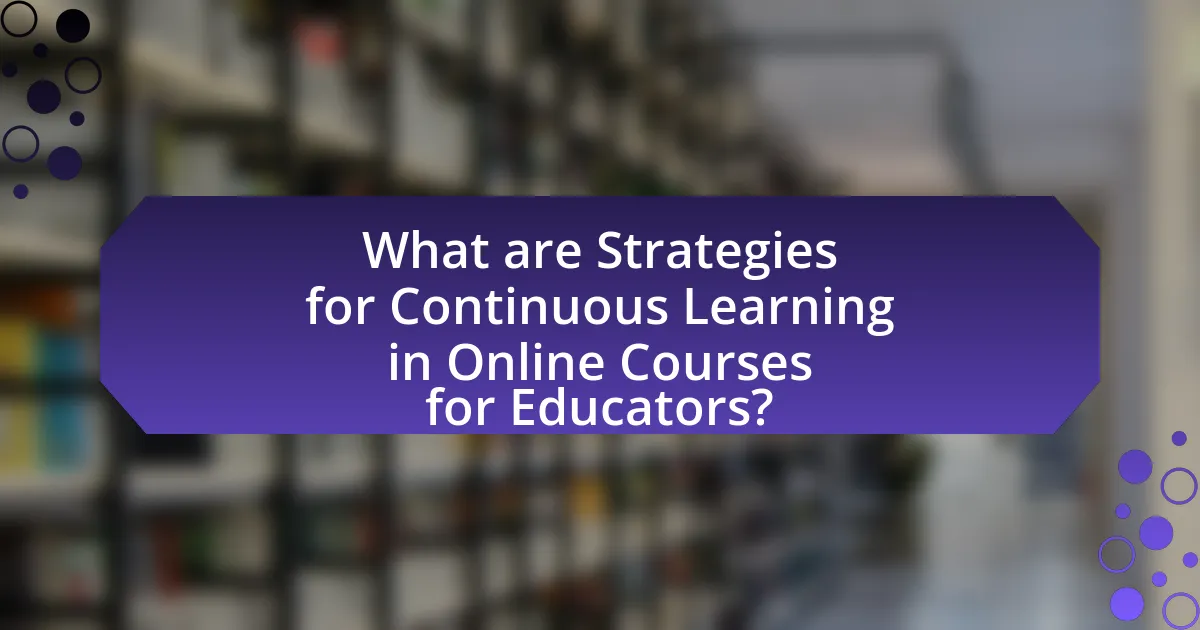
What are Strategies for Continuous Learning in Online Courses for Educators?
Strategies for continuous learning in online courses for educators include engaging in professional development, utilizing peer collaboration, and incorporating reflective practices. Professional development opportunities, such as webinars and online workshops, allow educators to stay updated on the latest teaching methodologies and technologies. Peer collaboration through discussion forums and study groups fosters knowledge sharing and support among educators, enhancing their learning experience. Reflective practices, such as journaling or self-assessment, enable educators to evaluate their teaching strategies and identify areas for improvement, leading to more effective teaching outcomes. These strategies are supported by research indicating that continuous professional development positively impacts teaching effectiveness and student learning outcomes.
How do online courses facilitate continuous learning for educators?
Online courses facilitate continuous learning for educators by providing flexible access to updated content and professional development opportunities. These courses allow educators to learn at their own pace, accommodating their schedules and enabling them to engage with new teaching methodologies, technologies, and subject matter expertise. Research indicates that 70% of educators prefer online learning for its convenience and accessibility, which supports ongoing professional growth. Additionally, online platforms often include interactive elements such as forums and peer collaboration, fostering a community of practice that enhances learning experiences.
What types of online courses are available for educators?
Online courses available for educators include professional development courses, subject-specific training, technology integration courses, classroom management workshops, and courses on educational leadership. These courses are designed to enhance teaching skills, update knowledge in specific subject areas, and improve classroom practices. For instance, the National Education Association offers various online professional development courses that focus on current educational trends and methodologies, ensuring educators remain effective in their roles.
How do these courses cater to different learning styles?
These courses cater to different learning styles by incorporating a variety of instructional methods, such as visual, auditory, and kinesthetic approaches. For instance, visual learners benefit from infographics and videos, auditory learners engage with podcasts and discussions, while kinesthetic learners participate in interactive activities and simulations. Research indicates that diverse teaching strategies enhance retention and understanding, as evidenced by a study published in the Journal of Educational Psychology, which found that students exposed to multiple modalities scored higher on assessments compared to those who experienced a single teaching method. This multi-faceted approach ensures that all learners can access and engage with the material effectively.
Why is continuous learning important for educators?
Continuous learning is important for educators because it enhances their teaching effectiveness and keeps them updated with the latest educational practices and technologies. Educators who engage in continuous learning can adapt to diverse student needs, incorporate innovative teaching methods, and improve student outcomes. Research indicates that teachers who participate in ongoing professional development are more likely to implement new strategies in the classroom, leading to increased student engagement and achievement. For instance, a study by the National Staff Development Council found that effective professional development can lead to a 21% increase in student learning outcomes.
What impact does continuous learning have on teaching effectiveness?
Continuous learning significantly enhances teaching effectiveness by equipping educators with updated knowledge and innovative teaching strategies. Research indicates that teachers who engage in ongoing professional development, such as online courses, demonstrate improved instructional practices and student outcomes. For instance, a study published in the “Journal of Teacher Education” found that teachers who participated in continuous learning programs reported a 30% increase in their ability to implement effective teaching methods. This ongoing education fosters adaptability, allowing educators to meet diverse student needs and incorporate the latest educational technologies, ultimately leading to a more engaging and effective learning environment.
How does continuous learning benefit student outcomes?
Continuous learning significantly enhances student outcomes by fostering critical thinking, adaptability, and a deeper understanding of subject matter. Research indicates that students engaged in continuous learning environments demonstrate improved academic performance, as they are more likely to retain information and apply knowledge effectively. For instance, a study published in the Journal of Educational Psychology found that students who participated in ongoing learning opportunities scored 20% higher on assessments compared to their peers who did not engage in such practices. This improvement is attributed to the development of metacognitive skills, which enable students to evaluate their learning processes and make necessary adjustments.
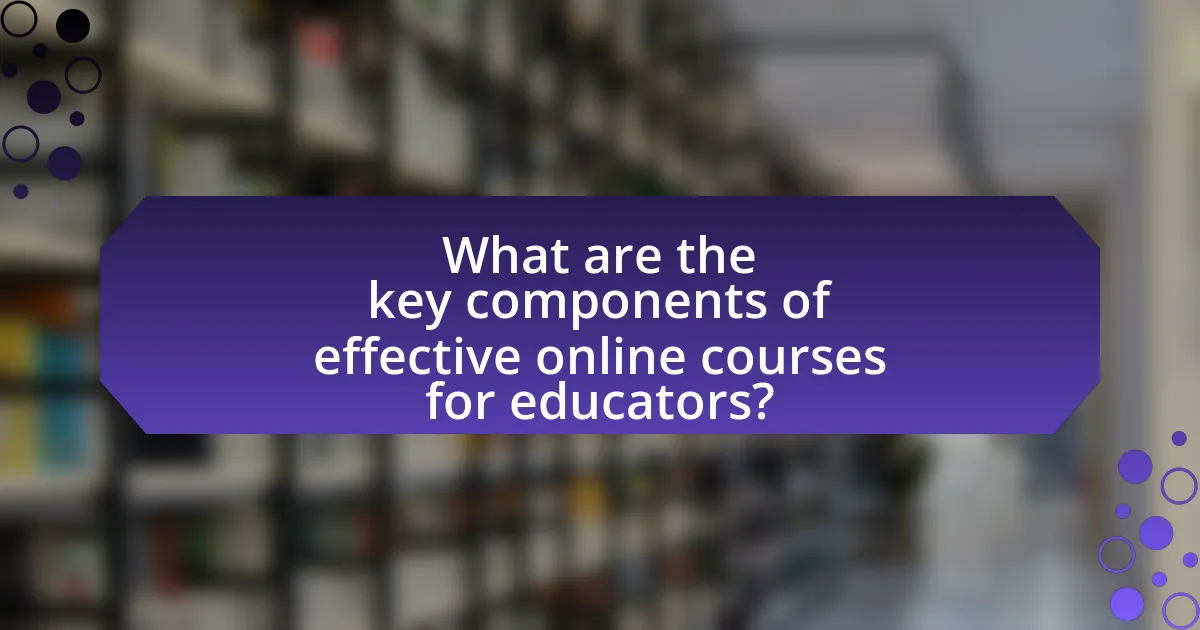
What are the key components of effective online courses for educators?
The key components of effective online courses for educators include clear learning objectives, engaging content, interactive elements, timely feedback, and robust assessment methods. Clear learning objectives provide a roadmap for both instructors and learners, ensuring that educational goals are well-defined and measurable. Engaging content, such as multimedia resources and real-world applications, enhances learner interest and retention. Interactive elements, like discussion forums and collaborative projects, foster community and active participation among educators. Timely feedback is crucial for guiding learners’ progress and improving their understanding, while robust assessment methods, including formative and summative assessments, ensure that educators can evaluate their learning effectively. Research indicates that courses incorporating these components lead to higher satisfaction and improved learning outcomes among participants.
How do course design and structure influence learning outcomes?
Course design and structure significantly influence learning outcomes by determining how content is delivered, organized, and engaged with by learners. Effective course design incorporates clear learning objectives, appropriate assessment methods, and interactive elements that cater to diverse learning styles, which enhances student engagement and retention of information. Research by the U.S. Department of Education indicates that well-structured online courses, which include interactive components and timely feedback, can lead to improved academic performance compared to traditional formats. Additionally, a study published in the Journal of Online Learning Research found that courses designed with a modular structure allow for better pacing and personalization, further supporting positive learning outcomes.
What role does interactivity play in online learning?
Interactivity plays a crucial role in online learning by enhancing engagement and improving knowledge retention. Research indicates that interactive elements, such as quizzes, discussions, and simulations, actively involve learners, making them more likely to absorb and apply information. A study published in the Journal of Educational Psychology found that students who participated in interactive learning activities scored significantly higher on assessments compared to those who engaged in passive learning methods. This demonstrates that interactivity not only fosters a deeper understanding of the material but also promotes a more enjoyable and effective learning experience.
How can assessments be effectively integrated into online courses?
Assessments can be effectively integrated into online courses by utilizing a variety of formative and summative evaluation methods that align with learning objectives. Incorporating quizzes, discussion forums, peer assessments, and project-based evaluations allows for continuous feedback and engagement. Research indicates that online courses that include regular assessments can enhance student retention and understanding; for instance, a study by the U.S. Department of Education found that students in online courses with frequent assessments performed better than those without. Additionally, using technology tools such as learning management systems can streamline the assessment process, making it easier for educators to track progress and provide timely feedback.
What technologies enhance online learning experiences for educators?
Technologies that enhance online learning experiences for educators include Learning Management Systems (LMS), video conferencing tools, and interactive content creation platforms. Learning Management Systems, such as Moodle and Canvas, provide a centralized platform for course management, tracking student progress, and facilitating communication. Video conferencing tools like Zoom and Microsoft Teams enable real-time interaction, fostering engagement and collaboration among educators and students. Interactive content creation platforms, such as Nearpod and Edpuzzle, allow educators to create dynamic lessons that incorporate multimedia elements, quizzes, and assessments, enhancing student participation and understanding. These technologies collectively improve the quality and effectiveness of online education by promoting engagement, accessibility, and personalized learning experiences.
Which platforms are most popular for online educator courses?
The most popular platforms for online educator courses are Coursera, Udemy, and edX. These platforms offer a wide range of courses specifically designed for educators, covering various subjects and teaching methodologies. Coursera partners with universities and organizations to provide accredited courses, while Udemy features a vast library of user-generated content, allowing educators to learn from peers. edX, founded by Harvard and MIT, offers high-quality courses from top institutions, focusing on professional development for educators. These platforms are widely recognized for their accessibility, diverse course offerings, and the ability to earn certificates that enhance educators’ credentials.
How do tools like video conferencing and discussion forums support learning?
Video conferencing and discussion forums enhance learning by facilitating real-time interaction and collaborative engagement among learners. Video conferencing allows participants to engage in live discussions, ask questions, and receive immediate feedback, which fosters a dynamic learning environment. Research indicates that synchronous communication through video conferencing can improve understanding and retention of information, as learners can clarify doubts instantly and engage in deeper discussions.
Discussion forums, on the other hand, provide a platform for asynchronous communication, enabling learners to reflect on topics, share insights, and engage in thoughtful dialogue at their own pace. Studies show that discussion forums can enhance critical thinking skills and promote a sense of community among learners, as they encourage diverse perspectives and continuous interaction over time. Together, these tools create a comprehensive learning experience that supports both immediate and reflective learning processes.
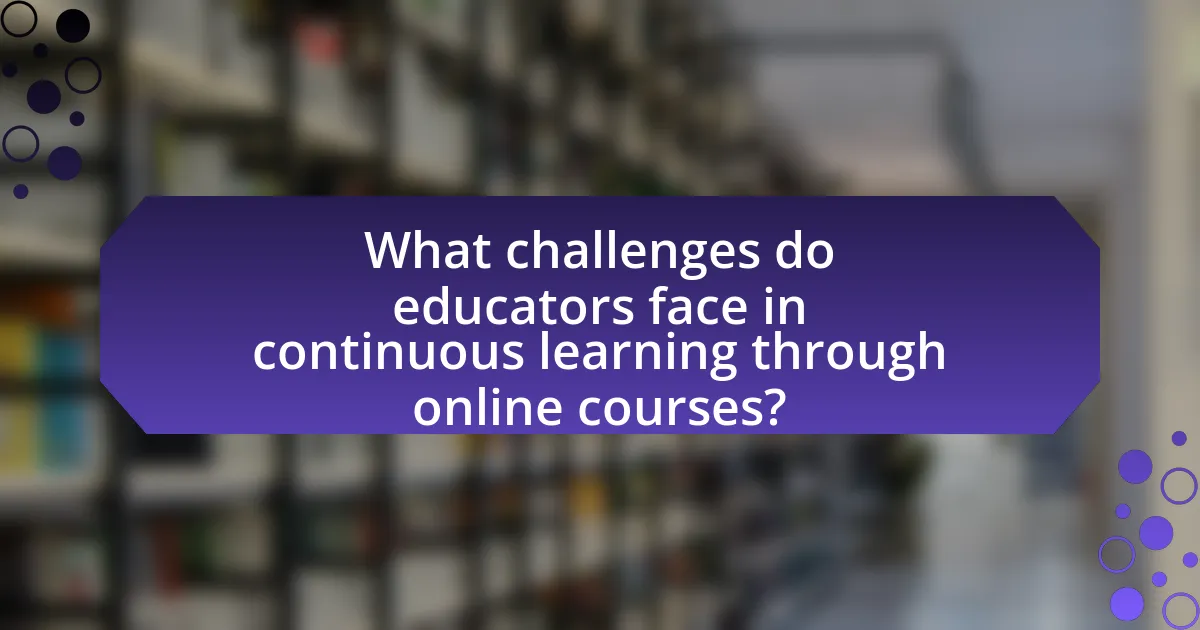
What challenges do educators face in continuous learning through online courses?
Educators face several challenges in continuous learning through online courses, including time constraints, lack of engagement, and varying levels of technological proficiency. Time constraints often arise from educators’ existing responsibilities, making it difficult to allocate sufficient time for online learning. A study by the Educause Review found that 70% of faculty members reported time as a significant barrier to participating in professional development. Additionally, lack of engagement can stem from the impersonal nature of online courses, which may lead to lower motivation and completion rates. Furthermore, varying levels of technological proficiency among educators can hinder their ability to effectively navigate online platforms, resulting in frustration and decreased learning outcomes. These challenges collectively impact the effectiveness of continuous learning initiatives for educators.
How can time management affect participation in online courses?
Effective time management significantly enhances participation in online courses by allowing learners to allocate sufficient time for studying, engaging with course materials, and completing assignments. When students manage their time well, they are more likely to meet deadlines, participate in discussions, and absorb information effectively. Research indicates that students who employ time management strategies, such as setting specific study schedules and prioritizing tasks, report higher levels of engagement and academic success in online learning environments. For instance, a study published in the “Journal of Educational Psychology” found that students who practiced effective time management techniques achieved better grades and demonstrated increased participation in online discussions compared to those who did not.
What strategies can educators use to balance teaching and learning?
Educators can balance teaching and learning by implementing differentiated instruction, formative assessment, and collaborative learning strategies. Differentiated instruction allows educators to tailor their teaching methods to meet the diverse needs of students, ensuring that each learner engages with the material at their own level. Formative assessments provide ongoing feedback, enabling educators to adjust their teaching based on student understanding, which fosters a more effective learning environment. Collaborative learning encourages students to work together, enhancing peer-to-peer interaction and promoting deeper understanding of the content. Research indicates that these strategies lead to improved student engagement and academic performance, as evidenced by studies showing that differentiated instruction can increase student achievement by up to 30% in certain contexts.
How can educators overcome technological barriers in online learning?
Educators can overcome technological barriers in online learning by implementing comprehensive training programs for both instructors and students. Research indicates that effective training enhances digital literacy, which is crucial for navigating online platforms. For instance, a study by the Educause Review found that institutions providing targeted technology training saw a 30% increase in student engagement and satisfaction. Additionally, educators can utilize user-friendly platforms that offer robust support resources, ensuring that all participants can access necessary tools without frustration. By fostering a supportive online environment and continuously updating training materials, educators can significantly reduce technological barriers and enhance the overall learning experience.
What support systems are available for educators pursuing online courses?
Educators pursuing online courses have access to various support systems, including online learning platforms, professional development resources, and peer networks. Online learning platforms like Coursera and edX offer structured courses with built-in support features such as discussion forums and instructor feedback. Professional development resources, including webinars and workshops provided by educational institutions and organizations, enhance educators’ skills and knowledge. Additionally, peer networks, such as teacher communities on social media or dedicated forums, facilitate collaboration and sharing of best practices among educators. These support systems collectively contribute to a more effective online learning experience for educators.
How can professional learning communities enhance online learning experiences?
Professional learning communities enhance online learning experiences by fostering collaboration among educators, which leads to improved teaching practices and student outcomes. These communities provide a structured environment where educators can share resources, discuss challenges, and develop strategies tailored to online learning contexts. Research indicates that collaborative professional development can increase teacher efficacy and engagement, ultimately benefiting student learning. For instance, a study by Vescio, Ross, and Adams (2008) found that schools with active professional learning communities reported higher student achievement levels, demonstrating the positive impact of collaborative learning on educational effectiveness.
What resources are available for educators seeking guidance in online learning?
Educators seeking guidance in online learning can access a variety of resources, including professional development courses, online teaching communities, and educational technology platforms. For instance, organizations like the International Society for Technology in Education (ISTE) offer comprehensive resources and training specifically designed for educators transitioning to online learning environments. Additionally, platforms such as Coursera and edX provide courses on online pedagogy, which are developed by reputable universities and institutions. These resources are validated by their widespread use in teacher training programs and positive feedback from educators who have successfully implemented online teaching strategies.
What are best practices for engaging in continuous learning through online courses?
Best practices for engaging in continuous learning through online courses include setting clear learning goals, selecting relevant courses, and actively participating in course activities. Setting specific, measurable goals helps learners focus their efforts and track progress. Choosing courses that align with professional development needs ensures that the learning is applicable and beneficial. Active participation, such as engaging in discussions, completing assignments, and networking with peers, enhances understanding and retention of the material. Research indicates that learners who actively engage with course content are more likely to achieve their learning objectives, as demonstrated by a study published in the Journal of Educational Psychology, which found that active learning strategies significantly improve knowledge retention and application.
How can educators set effective learning goals for online courses?
Educators can set effective learning goals for online courses by utilizing the SMART criteria, which stands for Specific, Measurable, Achievable, Relevant, and Time-bound objectives. This framework ensures that goals are clear and attainable, enhancing student engagement and success. For instance, a specific goal might be for students to complete a project by the end of the course, which can be measured through submission and grading. Research indicates that well-defined learning goals improve student performance; a study published in the Journal of Educational Psychology found that students who understood their learning objectives performed significantly better than those who did not. By applying the SMART criteria, educators can create structured and focused learning experiences that facilitate continuous improvement in online education.
What tips can help educators maximize their online learning experience?
Educators can maximize their online learning experience by actively engaging students through interactive tools and fostering a collaborative environment. Utilizing platforms like discussion forums, quizzes, and breakout rooms encourages participation and enhances understanding. Research indicates that interactive learning can improve retention rates by up to 60%, as highlighted in a study by the University of Colorado Boulder. Additionally, providing timely feedback and personalized support helps address individual learning needs, further optimizing the online educational experience.
